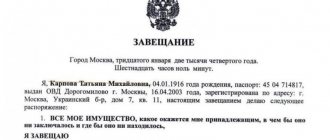How to find out if there is an inheritance
It is not the responsibility of the notary or relatives to notify the heirs about the property. In this case, you can only find out about it by chance. The easiest way is to ask a relative during his lifetime. Those who were present when the document was drawn up do not have the right to disclose its contents or even its existence. Only the testator can do this.
The organization has the right to post death data in its information database or on other resources. Some materials are not publicly available. The notary is engaged in publication and notification on his own initiative. Common problems when transferring property:
- not knowing about the existence of a will;
- not receiving information about death;
- not knowing about your share.
Only the heir himself is responsible for ignorance. Relatives or the notary do not bear administrative responsibility for finding the legal owner of the property. There are several ways to find out about a will.
The secrecy of a will – how to use the service taking this factor into account?
The offered service is quite convenient, and you can get information about the inheritance there very quickly. The creation and filling of the registry had several goals:
- providing assistance in finding the necessary documents relating to testamentary acts;
- reduction in the number of crimes related to receiving an inheritance.
Immediately after the introduction of the service, the number of crimes of this nature decreased by 4.5 times. Numerous violations were identified related to the fact that documentation was completed retroactively or notaries entered into a criminal conspiracy with fraudsters, drew up false papers and subsequently received property that did not legally belong to them.
The Unified Register was developed taking into account compliance with all legal requirements. The important point is that the secrecy of the will should not be violated, and the legal heirs would be able to obtain the necessary information and in the future take ownership of the property.
While the testator is alive, no one will be able to see the will in the registry, or check the information with a notary. Access to the database is granted to a citizen only after he has visited a notary and presented a package of documentation:
- passport;
- death certificate of the testator;
- paper certifying family ties with the deceased, for example, a birth certificate, or a marriage certificate.
By last name
How to find out if there is an inheritance online by last name? In addition to the paper version of the document, information about all heirs is contained in the Unified Information System. If the person is mentioned in the will, the notary must respond to the request and provide information. To search for a will using the full name of the heir, you need to go to the FNP website or to the notary office where the person was previously registered at his place of residence. To search for a hereditary document through the website you need:
- Follow the link https://notariat.ru/ru-ru/help/probate-cases/.
- Enter your full name, date of birth and death.
- To start searching.
If the heir is sure of the person’s death, but cannot find the will online, he needs to contact a notary at the place of residence of the testator. To receive information from employees, you must provide:
- passport;
- death certificate of a person;
- documents on the degree of relationship.
The last point is not mandatory, but it will significantly speed up the process, since the queue for inheritance is often formed according to the degree of relationship. The local notary office may not have a will, then you need to send a request to the regional authority, where all such documents are reviewed. If it was not there, there is a high probability that the deceased did not draw up the document.
Search for inheritance cases: who needs it
A service for searching inheritance cases simplifies the life of heirs - real and potential. Especially those who have conflicting relationships with the testator and his relatives, or do not communicate with them at all. For example, there are often cases when a father leaves his wife with a child and starts a new family. If he does not want to communicate with his son or daughter from his first marriage, they are still his legal heirs, and in the absence of a will, they have the right to claim a share in the inheritance of their deceased father. Now they can make inquiries about the inheritance matter without disturbing the testator’s relatives.
Often relatives try to deliberately hide the fact of a person’s death from other heirs so that they miss the six-month statute of limitations and cannot lay claim to the deceased’s property. The Federal Chamber of Notaries, by creating a search for inheritance cases based on brief information about a person, deprives unscrupulous applicants for an inheritance of the opportunity to hide the fact of opening an inheritance case. Thanks to the service developed by FNP, the interested person will be able to find out which notary is dealing with him, find out his location, phone number, and other contact information.
Abroad
How to find out what inheritance is left after the death of a relative abroad? To obtain information about a will, it is necessary to take into account foreign legislation. The transfer of property will go faster if relatives in another country facilitate this. Otherwise, the heir is recommended to use the services of a law firm. A common practice is for several persons living in other countries to inherit the property of a deceased person. The notary considers each such case individually, since the deadlines for filing an application for acceptance of inheritance are different on two or more sides.
It will not be possible to contact the authorities at the place of registration of the deceased directly, so you need to use paid search services for each country.
How to find out who has entered into an inheritance
How to find out about inheritance if there is no will? To understand whether a person has entered into an inheritance, you need to check the queues for legal inheritance. There are five main queues:
- Wife/husband, children, mother/father.
- Brother/sister, grandmother/grandfather.
- Uncles/aunts.
- Those who lived with the deceased in the same family for more than five years.
- Non-blood relatives (stepfather, stepmother, etc.)
Living with the testator must be confirmed by a document confirming registration at the address. If it is not there, you can get confirmation through the court. Such a document will be taken into account when distributing the state. If the deceased did not take care of the will, the relatives must contact the notary themselves.
How to find the heirs of a deceased person
The notary will post an advertisement for the search for heirs in the media and on his website. If there is a party who is interested in transferring property to relatives, it is necessary:
- Use social networks to search.
- Check the electronic register of citizens of the country.
- Establish connections through distant relatives.
- Collect information from the places where they lived.
- Put on the wanted list.
- Contact a special organization to search for people.
If the receiver shows up too late, the relatives can enter into an agreement and transfer part of the inheritance to him at their own request.
What information should be contained in the register?
By turning to this option for clarifying information, the client will be able to find out not only about the availability of documentation under the will, but also obtain additional information. In particular, people will be able to resolve issues related to the preparation of two testamentary acts at once. The document that was issued later will be considered official.
The important point is that all adjustments and emerging additions and changes are made to the document immediately. The following data can be specified as mandatory information that must be present in the register:
- Full name of the person who made the will;
- Full name of the person who certified the will;
- legal address of the notary office where the document is stored;
- document number and date;
- dates when amendments were made to the act at the request of the testator;
- month, day and year when the documents were closed.
It is important to note that there is no information about the property transferred as an inheritance in the registry, including size and cost.
Deadlines for accepting an inheritance
You can submit an application for acceptance of inheritance within 6 months. A potential heir should take into account that:
- the accounting begins the day after the death of the testator;
- the deadline includes all weekends;
- If the last day of the period falls on a holiday, it is extended until the next working day.
After six months, the relative will not be able to apply. This is regarded by the notary as unwillingness to accept the property. But there is a procedure for restoring the deadline.
Restoring the deadline for accepting an inheritance
You can regain your right to accept an inheritance only through the court. The potential heir prepares a statement of claim, indicating one of the reasons:
- did not know about his property;
- business trip;
- disease;
- was not informed about the death of a relative;
- didn't know about its existence.
The court may restore the term of an incapacitated or minor heir.
Legislative framework of the issue
A will is the main document of the will of the testator, which allows the transfer of personal property and non-property rights to the heirs at the time of acceptance of the inheritance (death of the testator).
The Civil Code, which defines the entire procedure of inheritance, including by will, does not contain a specific definition, but clearly outlines its main features:
- a will can be executed in two written forms: open and closed;
- drawn up by the testator in a state of full legal capacity in two copies;
- is certified in the presence of a notary, and sometimes witnesses;
- a written will expresses the will of only one person in favor of one or more persons.
- a will is a one-sided type of transaction.
We suggest you read: Entering into an inheritance after the death of a mother without a will
The algorithm for searching for a will is described in this article.
Problems when receiving an inheritance
After receiving the property, the heir may face a number of problems. Before writing an application for acceptance, you need to consider:
- Along with the property, debts are also transferred. The bank may notify the new owner on time or only after the statute of limitations has expired. The amount of debt should not exceed the value of the property received, but the heir pays state duties and other expenses.
- Problems with searching for property. This may be real estate in other countries or cities. All costs of finding it fall on the heir. If there is no will, then finding a property can be difficult.
- Bank deposits of the deceased. The heir must submit requests to banks to search for the deceased's accounts before the deadline for filing an application for acceptance of the property expires. This is difficult to do when the heir is a distant relative who is not aware of all the financial transactions of the deceased.
You should ask the relatives of the deceased or a lawyer in advance about all the pitfalls of inheritance.
Features of searching for the heirs of a deceased debtor
Situations often arise when the heir, along with the property of the deceased, receives his debts. Therefore, they rarely seek to declare to the bank their intention to repay the deceased’s loan. In addition, there are cases when the heirs have no idea that the testator has debts. In this case, the lender needs to perform the following steps:
- contact a notary office that deals with specific inheritance matters;
- write a claim on behalf of the creditor (in accordance with the provisions of Article 63 of the Fundamentals of Legislation on Notaries). It must indicate the amount of debt, the reasons for the debt;
- get a response from a notary. If the heirs are discovered, the employee of the notary office will provide the specified information to the applicant along with information about the inheritance, which may be subject to foreclosure if the heirs refuse to repay the debt.
Another way is to file a claim in accordance with the provisions of Article 1175 of the Civil Code. It must indicate as a defendant the notary who disposes of the property of the deceased. In this case, when heirs are found, they will become the proper heirs.
Most often, the heirs themselves find out about the emergence of the right to receive the property of their relative (or another person who indicated these persons as heirs).
If there are no heirs (or they do not know about the death of their relative or testator), a notary is looking for them. But not all notaries search for citizens, so it is best to find out the information yourself.
Your rating of the article
Finding a Will Made in Emergency Circumstances
How can I find out about an inheritance or will made in emergency circumstances? The form of such documents has been simplified. The inheritance case was drawn up in conditions of danger to the life of the property owner and the absence of the possibility of proper registration with a notary. The will loses legal force if the participants do not apply to a notary a month after it is written. The signing of a document, in such conditions, can be certified by unauthorized persons (two or more).
The court takes into account a will drawn up under emergency circumstances as a full-fledged document on the transfer of property. The search procedure is entirely up to the heir. It is much easier to restore the deadline for filing an application under such circumstances.









